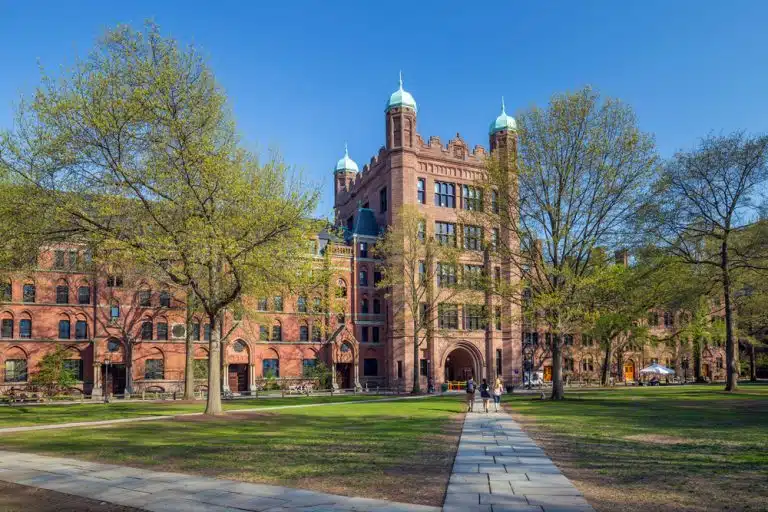If you’re searching for outstanding college classes, Yale has some of the best to offer. As an Ivy League school, it is popular for its academic excellence and forward-thinking approach, and the best classes at Yale reflect that high standard.
Whether you’re attending intimate seminar discussions or large lecture halls, you’ll find that Yale’s professors are committed to delivering a world-class education that both challenges and inspires you.
If you are interested in classical literature, high-impact scientific research, or the intricacies of politics and social issues—Yale’s top classes will meet your passion for learning. In this blog, we list down 10 of the best classes at Yale and highlight the reasons they are on the list.
- Top 10 Classes at Yale
- The Undergraduate Curriculum at Yale
- Yale’s Distributional Requirements
- Frequently Asked Questions
- Takeaways
Top 10 Classes at Yale
What are some of Yale’s most highly regarded programs? Like most students, you’re probably looking for courses that are both interesting and manageable to make your academic life a little easier. Also, college can be a lot more enjoyable when you find a good balance between schoolwork and other activities.
To help you out, here are some of the best classes at Yale University:
1. PHIL 281a – Infinity
In this class, you’ll explore topics you wouldn’t typically expect to find on a standard syllabus. It’s a class that helps you understand the broader scope of the world’s imagination. It explores concepts like time, space, ideas, and more.
You’ll dive into traditional and modern paradoxes related to space, time, and motion, as well as paradoxes of classes, chance, and truth. The course also touches on foundational elements of arithmetic, geometry, probability theory, and set theory.
Moreover, this class explores the fascinating archaeological myths and legends tied to various nations and cities as it traces how these places evolved over time. You’ll also engage in discussions on political powers, spirituality, and cults, gaining insights into the controversies surrounding them.
2. NTH 172/ARCG 172 – Great Hoaxes and Fantasies in Archaeology
Widely regarded as one of the best classes at Yale, it covers intriguing topics like the Piltdown Man—a forged skull that falsely “proved” early humans had large brains—and the Kensington Runestone, “discovered” in Minnesota in 1898, which misleadingly suggested Vikings had reached the Midwest. You’ll also study the myth of Atlantis, first introduced by Plato as a fictional land that vanished into the sea after battling Athens.
Taught by Professor Marcello A. Canuto, this class encourages students to think critically about how information is spread and why figures like Indiana Jones are more well-known than A.V. Kidder, who revolutionized American archaeology. His goal is to make archaeology more accessible to the public.
3. ENGL 358 – Literature for Young People
We get it—James Joyce is a literary giant, but who wouldn’t want the chance to read Harry Potter for a class? Well, here’s your opportunity. Taught by Michele Stepto in the English department, this seminar offers an eclectic approach to stories and storytelling for and by children. This is one of the best classes at Yale for students who are wide readers.
Last year’s reading list included 19 classics, such as Roald Dahl’s Matilda, E.B. White’s Charlotte’s Web and Stuart Little (Yale’s Cross Campus has a soft spot for E.B. White), Mark Twain’s The Adventures of Huckleberry Finn, L. Frank Baum’s The Wonderful Wizard of Oz, and, of course, some Harry Potter. It’s the perfect chance to reconnect with those childhood favorites you were sad to leave behind.
4. AFAM 118 – Is that Racist?
How can we tell when something is racist, and how do we convince those who are skeptical? This course is aimed to help you move beyond surface-level discussions by understanding the various ways social theorists have defined racism and the methods they’ve used to demonstrate it. You’ll read, critique, and synthesize research from different disciplines with the goal of shaping your own understanding of the term.
It is considered one of the best classes at Yale because it allows you to explore the impact of labeling something as racist—who benefits, who suffers, and how racism plays out in different contexts, mainly within the United States. You’ll also learn popular methods for proving whether an idea, behavior, or institution is racist, and how evidence (or the lack of it) can sometimes obscure or misdiagnose racism.
Throughout the course, you’ll apply the theoretical and practical lessons we learn to the real world—from popular culture to everyday conversations around the dinner table.
5. CSYC 265 – Great Big Ideas
Most students enroll in this class, and one of its units consistently earns top ratings. It is considered one of the best classes at Yale. First, it has significantly influenced Yale’s teaching approach. Additionally, it helps bridge the gap between academic ideas and global discussions, making complex concepts feel more relatable.
This course is designed to give students a broad introduction to different disciplines before they choose a major. Over 12 weeks, you’ll dive into a new field each week—anything from linguistics to biomedical research to investing—through video lectures from experts, followed by group discussions in seminars. This semester, 300 students applied for just 18 spots, but hey, it’s worth a shot!
6. HSAR 115 – Introduction to the History of Art: Renaissance to the Present
This is one of the best classes at Yale about art. This class explores art history from the Renaissance to today, starting with Raphael and ending with contemporary African-American artist Kara Walker.
You’ll study various mediums like painting, sculpture, photography, architecture, and film. While the focus is on European and American artists, the course emphasizes the cultural exchanges between Europe, the Americas, Asia, and Africa. It challenges the idea that Euro-American traditions dominate art history.
You’ll build skills in observation, visual analysis, and research. Although designed for virtual learning, the course includes access to Yale’s collections, and if you’re on campus, you may explore these in person. A group project will also let you curate a virtual exhibition using Neatline, a geotemporal exhibit-builder.
7. APHY 110/ENAS 110 – The Technological World
This class doesn’t require any prior knowledge from science classes, which makes it much easier to grasp right from the start. Concepts are explained in clear, straightforward language, making the learning experience more enjoyable.This makes this one of the best classes at Yale.
You’ll explore modern technologies that impact daily life. You’ll dissect the science behind them, their current uses, and their future potential. Topics include solar cells, LEDs, computer displays, GPS, fiber-optic communication, and how technology is advancing medicine. It’s perfect for students who aren’t majoring in science or engineering, with no need for college-level science or math.
8. PLSC 201 – Ideas and Presidential Power: From the Founding to Trump
As you know, the American presidency holds significant power. To truly understand the powers that presidents wield, you need to examine the ideas that have shaped and legitimized presidential authority over time. In this class, you’ll explore how these ideas have both justified presidential power and transformed the presidency as an institution – from the Founding era through the Trump administration.
You’ll be familiar with concepts like the separation of powers, executive authority, the role of the Commander in Chief, mandates, presidential representation, responsible party government, the unitary executive theory, the “Deep State,” descriptive representation, and American exceptionalism. Its relevance in today’s political climate makes it one of the best classes at Yale.
9. RLST 490 – Religion and Society
Religious Studies offers a deep look into various religious traditions and value systems. You’ll study the history and meaning of rituals, sacred texts, and the beliefs that shape societies, institutions, and communities. The class, often considered one of the best classes at Yale, also explores how religion affects gender roles, global affairs, conflict, and violence.
The field draws from disciplines like anthropology, history, philosophy, and sociology, covering religious practices from ancient to modern times across different cultures. You’ll also examine how belief systems—such as fundamentalism, secularism, and consumerism—interact with pop culture and politics today.
10. ENGL 123 – Introduction to Creative Writing
ENGL 123 is one of the best classes at Yale that have something to do with writing. This class gives you a hands-on intro to writing fiction, poetry, and drama. It aims to build the foundational skills to create imaginative works. You’ll cover the basics of composition and dive into the specific techniques for each genre—like crafting characters and scenes in fiction, playing with sound and imagery in poetry, and writing dialogue and action for drama.
If you’re an English major interested in taking your creative writing further, the creative writing concentration offers a more focused path. While there are lots of ways to get involved with creative writing at Yale, this concentration gives you a structured approach and a supportive community, which many writers find rewarding.
It’s not a separate degree or certificate, but rather an extension of the English major that builds on the department’s strong literary foundation.
The Undergraduate Curriculum at Yale
Yale College, the undergraduate division of Yale University, offers a curriculum with more than 120 subjects across the liberal arts, sciences, and engineering.
For over 300 years, Yale has been a leader in undergraduate education in the liberal arts and sciences. Although the university has expanded to include graduate and professional programs, all undergraduate teaching still takes place within Yale College, which continues to be recognized globally for its excellence.
Yale College provides a liberal education designed to:
- Educate talented students from diverse backgrounds to lead and serve in an ever-changing, complex society.
- Offer a supportive residential learning community where social experiences and open exchange of ideas enrich the pursuit of knowledge.
- Develop students’ intellectual, moral, civic, and creative abilities alongside specialized skills that will help them succeed beyond college.
- Leverage Yale University’s strengths in the arts, humanities, social sciences, sciences, engineering, and professional fields.
Yale’s approach to education is all about helping you become open-minded, independent, and confident in making your own decisions—and owning them! They encourage curiosity, getting involved, and thinking about how you can make a difference in the world. At the same time, a Yale education sets you up for success in your career and any future studies you want to pursue.
This philosophy aligns with the Yale Report of 1828, which identifies between expanding the mind’s powers and storing them with knowledge. The report argued that sticking to a traditional curriculum focused on classical studies, like Latin and Greek, was the best way to sharpen the mind and develop the skills needed for leadership and good citizenship. It believed that education should be about broad, foundational learning rather than just prepping for specific careers. This approach ended up shaping higher education in the U.S. for many years, keeping the focus on a well-rounded academic experience.
While acquiring facts is important, Yale prioritizes teaching students how to think critically and creatively in different ways. This philosophy pretty much explains why Yale does what it does today as a university.
Yale’s Distributional Requirements
To meet the disciplinary area requirements, you’ll need to complete at least two course credits in the humanities and arts, two in the sciences, and two in the social sciences. Additionally, there are skills requirements: you’ll take at least two course credits in quantitative reasoning, two in writing, and courses to enhance your language proficiency. These courses are often considered the best classes at Yale.
Depending on your proficiency in a foreign language when you start, you may meet the language requirement with one, two, or three courses or by combining coursework with approved study abroad programs.
- The humanities and arts requirement (two credits) is all about helping you appreciate different cultures and forms of expression throughout history.
- The sciences requirement (two credits) lets you explore how the world works through observation and experimentation as it sharpens your critical thinking skills.
- The social sciences requirement (two credits) teaches you about human behavior and society, using various analytical methods to explore connections between people and communities, both familiar and foreign.
- The language requirement (at least one course, depending on your background) helps you improve your language skills and opens up new cultural doors while giving you access to untranslated texts and global perspectives.
- The quantitative reasoning requirement (two credits) equips you with math, stats, and logical analysis skills that are useful across all kinds of fields, from sciences to the humanities.
- The writing requirement (two credits) hones your writing skills, making it easier to express complex ideas and develop the intellectual habits that are key for leadership in just about any career.
Frequently Asked Questions
1. What is Yale known for?
Yale is known for its liberal arts education, faculty, strong emphasis on research, and top-notch professional programs in law, medicine, and business. It’s also famous for its residential college system, colorful campus culture, and global leadership in arts and humanities.
2. Is there a Yale Happiness course?
Yes, Yale has a super popular course called “The Science of Well-Being,” often nicknamed the “Yale Happiness Course.” Created by Professor Laurie Santos, it discusses the science behind happiness and teaches practical strategies to boost mental health and overall life satisfaction. It quickly became one of the most popular and best classes at Yale and is even available for free online through platforms like Coursera, so anyone can join in on the feel-good vibes!
3. What makes Yale unique?
It stands out for Yale University majors in liberal arts education, its unique residential college system that creates close-knit communities, and its faculty. On top of that, Yale is a leader in research and the arts. The university also places a big emphasis on global engagement, interdisciplinary studies, and has a long tradition of promoting public service and leadership. It’s a place where you can explore different fields while feeling part of a supportive community.
Takeaways
Yale University offers timely and relevant classes. Its Ivy League status makes these classes even more interesting, as they are taught by experts from around the world.
- The best classes at Yale encompass different areas of study, such as writing, politics, science and technology, and archeology.
- The university’s undergraduate education is guided by the Yale Report of 1828. This approach ended up shaping higher education in the U.S. for many years and kept the focus on a well-rounded academic experience.
- If Yale University is one of your dream schools, consider connecting with a college admissions expert to help you maximize your chances of getting into the said prestigious university.






